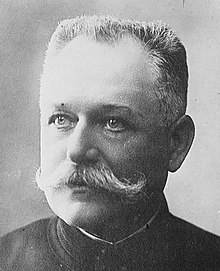Maurice Sarrail | |
|---|---|
 | |
| High Commissioner of the Levant | |
| In office 1924–1925 | |
| Preceded by | Maxime Weygand |
| Succeeded by | Henry de Jouvenel |
| Personal details | |
| Born | Maurice Paul Emmanuel Sarrail 6 April 1856 Carcassonne, France |
| Died | 23 March 1929 (aged 72) Paris, France |
| Awards | Grand Cross of the Legion of Honor Médaille militaire Croix de guerre 1914–1918 |
| Signature | |
| Military service | |
| Allegiance | |
| Branch/service | French Army |
| Years of service | 1877–1925 |
| Rank | Général de division |
| Commands | Third Army |
| Battles/wars | World War I Great Syrian Revolt |
Maurice Paul Emmanuel Sarrail (6 April 1856 – 23 March 1929) was a French general of the First World War.[1] Sarrail's openly socialist political connections made him a rarity amongst the Catholics, conservatives and monarchists who dominated the French Army officer corps under the Third Republic before the war, and were the main reason why he was appointed to command at Salonika.[2][3]
At the start of the war, Sarrail commanded VI Corps then Third Army in the Ardennes and around Verdun, where his army played an important role in the final stages of the First Battle of the Marne and where he took the credit for holding Verdun (later the site of an important battle in 1916). He was dismissed for poor leadership, amidst political uproar, in July 1915.
The Salonika campaign – chosen out of several strategic options presented by Sarrail – was intended originally to support Serbia, with Bulgaria entering the war on the side of the Central Powers, and later (as the Gallipoli campaign was winding down) to provide a chance for France to assert her economic and political influence over Greece and the declining Ottoman Empire. Sarrail ended up commanding a multinational Allied force amidst political intrigue and a state of near civil war in Greece, whose King Constantine was pro-German, whilst the Prime Minister Venizelos was pro-Allied and also keen to gain territory from the Turks in western Anatolia.[4] Despite a number of offensives, Sarrail's forces did not succeed either in conquering Bulgaria or in preventing the Central Powers' conquest of Serbia in 1915 or Romania in 1916. Sarrail was dismissed from his Salonika command in December 1917.
He later played a role in the French suppression of the Great Syrian Revolt in the mid-1920s.